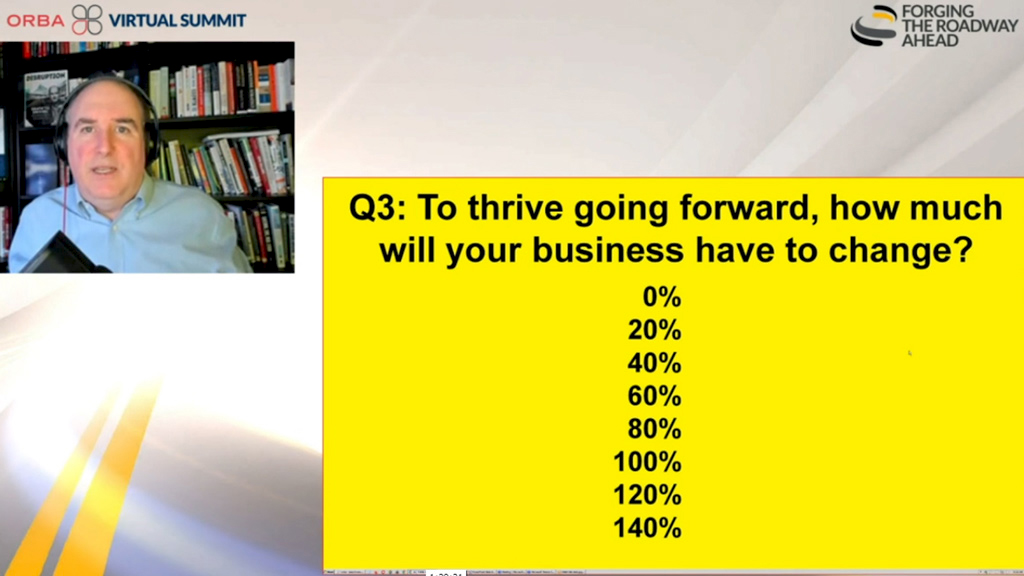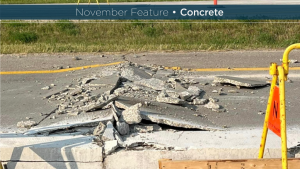The electrification of transportation is going to explode and drastically change how and what the roadbuilding industry builds, Jim Harris, a futurist and management consultant on disruptive innovation, told participants during the Ontario Road Builders’ Association’s first-ever virtual summit.
“The electrification of transportation, it’s been below the radar until now,” he explained. “If you don’t think that electrification is going to change the $10 trillion transportation market, think again. As roadbuilders we need to think about what are the implications of electrification for the roadways, what are the implications for charging stations, what are the implications for parking lots?”
In his keynote address, Time of Tremendous Transformation 2.0, on Jan. 27, opening day of the four-day summit billed Forging the Roadway Ahead, Harris said disruptive innovation starts so small you can barely see it. He said exponential change is like an avocado that is not ripe.
“It’s not ready for prime time for so long and then when it crosses over that linear experience it results in amazement and chaos and it’s too late to catch up,” said Harris. “In other words, for businesses we have to be getting familiar with the disruption before it reaches that critical overwhelmed stage.”
Electric vehicles (EVs) gaining popularity around the world
He talked about the automotive industry and pointed out the number of cars sold globally collapsed in 2020 because of the pandemic and although gas-powered car sales were down, EV sales were up.
“If you are thinking there is no way electrification is going to happen, in Norway it is cheaper to have an electric vehicle than it is to have a gas-powered car,” said Harris. “EVs are cheaper in terms of fuel and maintenance…but when they are cheaper to buy up front that’s when the tipping point happens. Once you hit that you will see a collapse of traditional cars or, if you’re looking at it the other way, the explosion of electric vehicles. We, I’m arguing, have already reached the tipping point.”
The shift in long haul trucking to electrification will also create work for roadbuilders.
“What are the implications for roadbuilders? We’re going to have to see charging stations and parking lots on the side of highways for these electric trucks and they are going to be big and they are going to take a lot of juice too.”
Another thing that is going to disrupt the transportation system is the use of scooters and ride sharing, especially with people not wanting to take public transit because of COVID-19.
“What are the implications for roadbuilders? We’re going to see a lot more bike paths.”
The impacts of disruption on businesses
Disruptive innovation impacts business owners and business valuation. Owners need to think about business models differently. Harris used an example of a CEO of a helical pile business he met at a conference in Alberta. When they caught up with each other a year later he told Harris he took the advice he had given him.
“(He said) I wanted to expand into the U.S. and what I would have historically done is built a $15 million design-build manufacturing facility, but you said to think differently, consult millennials in my company,” said Harris, recounting the conversation. “What we came up with is ‘let’s find a manufacturing facility that has a ton of spare capacity and rent it’ and we did that. We found a brand new facility, it had just been built and they over built by 100 per cent to allow for expansion. I got to rent that half for three years pennies to the dollar.’”
“Think about the impact on his financials when the pandemic hit,” Harris added. “He would have to be carrying $15 million and servicing that debt if he didn’t think differently. When we think differently, we can de-risk our business.”
He concluded with a graph of the last 50 years of surpluses and deficits in Canada showing the largest deficit in Canada’s history is due to COVID.
“The federal government sooner or later is going to have to pay the piper and they are going to cut transfers to provinces and provinces are going to cut transfers to municipalities and municipalities are going to have smaller capital budgets,” said Harris. “We are going to face a crunch at some point that is unprecedented…we are going to have to think differently about our cap-ex and our op-ex and how we run our businesses.”
Follow the author on Twitter @DCN_Angela.











Recent Comments
comments for this post are closed